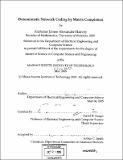Deterministic network coding by matrix completion
Author(s)
Harvey, Nicholas James Alexander
DownloadFull printable version (3.843Mb)
Other Contributors
Massachusetts Institute of Technology. Dept. of Electrical Engineering and Computer Science.
Advisor
David R. Karger.
Terms of use
Metadata
Show full item recordAbstract
Network coding is a new field of research that addresses problems of transmitting data through networks. Multicast problems are an important class of network coding problems where there is a single sender and all data must be transmitted to a set of receivers. In this thesis, we present a new deterministic algorithm to construct solutions for multicast problems that transmit data at the maximum possible rate. Our algorithm easily generalizes to several variants of multicast problems. Our approach is based on a new algorithm for maximum-rank completion of mixed matrices-taking a matrix whose entries are a mixture of numeric values and symbolic variables, and assigning values to the variables so as to maximize the resulting matrix rank. Our algorithm is faster than existing deterministic algorithms and can operate over smaller fields. This algorithm is extended to handle collections of matrices that can share variables. Over sufficiently large fields, the algorithm can compute a completion that simultaneously maximizes the rank of all matrices in the collection. Our simultaneous matrix completion algorithm requires working over a field whose size exceeds the number of matrices in the collection. We show that this algorithm is best-possible, in the sense that no efficient algorithm can operate over a smaller field unless P=NP.
Description
Thesis (S.M.)--Massachusetts Institute of Technology, Dept. of Electrical Engineering and Computer Science, 2005. Includes bibliographical references (leaves 81-85).
Date issued
2005Department
Massachusetts Institute of Technology. Department of Electrical Engineering and Computer SciencePublisher
Massachusetts Institute of Technology
Keywords
Electrical Engineering and Computer Science.